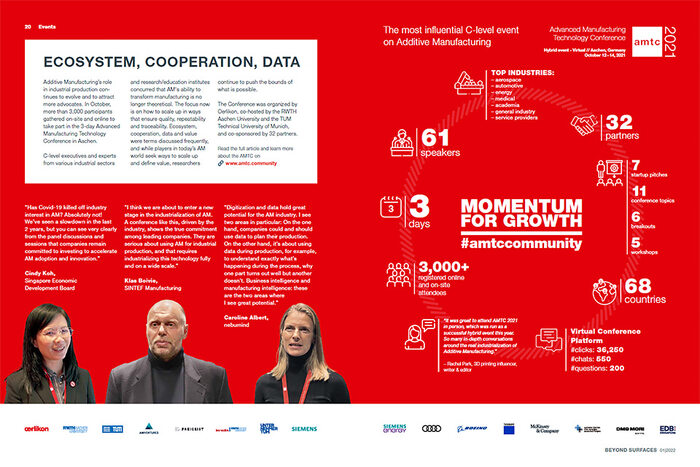Stories
Additive Manufacturing’s role in industrial production continues to evolve and to attract more advocates. In October, more than 3,000 participants gathered on-site and online to take part in the 3-day Advanced Manufacturing Technology Conference in Aachen. The Conference was organized by Oerlikon, co-hosted by the RWTH Aachen University and the TUM Technical University of Munich, and co-sponsored by 32 partners.
AMTC 2021 Expands Dimensions of Value of Additive Manufacturing
Ecosystem, cooperation, education, value underscore conversations
Additive Manufacturing’s role in industrial production is evolving. More than 3.000 registered online and on-site Additive Manufacturing devotees who heard from C-level and expert representatives from various industry sectors and research/education institutes at the 3-day Advanced Manufacturing Technology Conference in Aachen in October proved that AM is no longer questioning its ability to transform manufacturing, but rather focusing now on how to scale up in ways that ensure quality, reproducibility and traceability. The conference, organized by Oerlikon and co-hosted by the RWTH Aachen University was featured by over 30 partners.
Start-up event
The conference, themed Momentum for Growth, opened with an event in which seven start-up companies pitched their ideas to industry executives looking to support innovation. Ideas ranged from the company using AM to produce drives for electric vehicles to one aiming to make AM more scalable using an end-to-end high throughput process to one using data in ways that have achieved time savings of up to 80%. One offered an automated surgical planning software to surgeons.
Full day conference
Ecosystem, cooperation, data and value were terms heard frequently at the AMTC. Leaders from companies using Additive Manufacturing technology, those making the materials, software and hardware for the technology, and the universities supporting this growing industry took the stage to report on progress, integration opportunities and outstanding challenges. Two of Germany’s premier research universities, RTWH Aachen University and Technical University Munich, emphasized the need for collaborative research and education to institutionalize this advanced manufacturing technology and to accelerate its growth.
According to the participating audience reducing AM production costs was seen as a key challenge to AM. As Dr. Markus Seibold of Siemens Energy pointed out, this marks a shift from past years when the discussion was about the technology itself. Now the focus is where AM can add value and how to scale up. Jörg Spindler of Audi challenged participants to stop thinking about value-add in terms of specific components and instead to start at the beginning of the process and see how AM could play a role. Several speakers raised the topic of a 4th dimension in AM. For some, this was integrating technological capability into a part, like an airplane wing that is a battery. To others it was speeding up R&D using AM for swifter part testing.
While players in today’s AM world seek ways to scale up and define value, researchers continue to push the bounds of what’s possible. Prof. Christian Seidel of the Fraunhofer Institute demonstrated AM smart parts, which have sensors inserted into cavities during the printing process, and multi-material metal parts made of two or three different metal alloys.
This year’s conference had a stronger international dimension than previous years. Francisco Betti represented the World Economic Forum on several panels, emphasized the opportunity to consider the value chain on a global scale, identifying a need for more education and training on AM in many countries, and suggesting that value of AM should not be measured only in ROI and efficiency, but also in contributions toward sustainability and safety.
Contact
Event Location
Technische Universität München
Arcisstraße 21
80333 München
Germany
Oerlikon AM Europe GmbH
Freisinger Landstrasse 52
85748 Garching (Munich)
Contact Person
Jasmin Kliebenschädel
+41 58 360 99 33
Contact us
